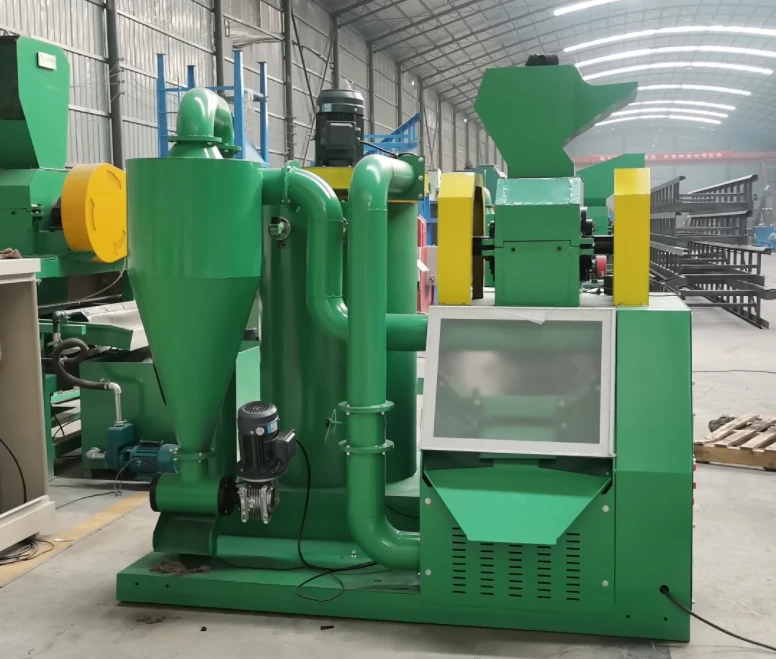
10 月 . 02, 2024 00:14 Back to list
Homemade Copper Wire Granulator A Practical Guide
In the world of recycling and metal recovery, copper wire is one of the most valuable materials due to its excellent conductivity and sheer volume of application in electrical systems. While industrial copper granulators are efficient, they can be expensive, which makes homemade alternatives an attractive option for hobbyists and small-scale operators. A homemade copper wire granulator can be a cost-effective way to process scrap copper wire and maximize your profit margins. This article will explore the basics of crafting your own granulator, its components, and safety considerations.
Understanding the Basics of Copper Wire Granulation
Before diving into the construction of a homemade granulator, it's essential to understand how copper wire granulators function. These machines are designed to shred insulated copper wire, separating the copper from the plastic insulation. The process typically involves two main stages shredding and separation. The shredded material is then processed through various methods, such as air separation or vibration, to recover the copper granules.
Designing Your Homemade Granulator
A successful homemade copper wire granulator can be built using materials often found at hardware stores or even repurposed from old machinery. Below are the crucial components and a basic outline of how to assemble your granulator
1. Shredding Mechanism The heart of your granulator is the shredding mechanism. This can be achieved using a powerful motor connected to a rotating blade or series of blades. Ensure the blades are made from high-quality steel for durability. The motor should have sufficient horsepower to handle the wire's density.
2. Feeding Chute To introduce the copper wire into the shredder, you need a feeding chute. A simple funnel-like structure made from metal or heavy plastic can guide the wire efficiently into the shredding section.

3. Granulation Chamber After shredding, the copper and plastic will be mixed. In this chamber, you’ll need to create a screen that allows smaller copper particles to pass through while retaining larger bits of plastic. A mesh screen with varying hole sizes can help segregate the materials effectively.
4. Separation Method You can use air flow for separation, which involves blowing air through the granulated mixture. The lighter plastic will be blown away, while heavier copper pieces will fall down. An alternative is to use vibration or a simple shake table to enhance the separation process.
5. Collector Below the separation area, you need a collection system to gather the recovered copper granules separately from the waste plastic. A container or bin should suffice for this purpose.
Safety Considerations
Safety should always be a priority when building and operating a homemade copper wire granulator. Working with sharp blades, powerful motors, and electrical components exposes you to various hazards. Here are some safety tips
- Always wear protective gear, including gloves, safety goggles, and sturdy clothing. - Ensure that all electrical components are properly insulated and securely mounted. - Keep the workspace clear of clutter to prevent accidents. - Invest in a circuit breaker and safeguard any high-voltage connections.
Conclusion
Crafting a homemade copper wire granulator is an engaging project that can yield financial advantages through increased copper recovery. While it does require initial effort and investment in materials, the satisfaction of creating an effective recycling tool is well worth it. By following safety protocols and designing carefully, you will be on your way to turning scrap copper wire into a profitable venture. With a little ingenuity and hard work, your homemade granulator could contribute not only to your financial goals but also to environmental sustainability through recycling efforts.
Latest news
Unveiling the Power of Eddy Current Separator
NewsSep.25,2024
Transform Your Home Recyclin:home metal shredder
NewsSep.25,2024
The Future of Waste Management with Recycling Line Picker
NewsSep.25,2024
The Benefits of a Metal Recycling Plant
NewsSep.25,2024
Revolutionize Material Separation with Onwang Technology
NewsSep.25,2024
Innovative Waste Management: Unveiling the MSW Sorting Plant
NewsSep.25,2024